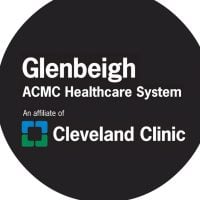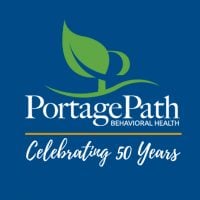Glenbeigh Outpatient Center of Canton
Drug Rehab Center in Canton, Ohio
Glenbeigh - Outpatient Center of Canton in Canton, Ohio is an accredited addiction treatment facility specializing in comprehensive services for individuals battling addiction and substance abuse, offering various levels of care, aftercare support, and sober-living options, and accepting private health insurance.
About This Canton, OH Facility
Glenbeigh Outpatient - Belpar, located in Canton, Ohio, is a premier drug and alcohol rehabilitation facility offering comprehensive outpatient treatment programs. Its primary focus is helping individuals overcome substance addictions and alcoholism in a supportive outpatient setting.
The facility provides a range of services, including family support, continuing care groups, assessments, and more, tailored to meet the unique needs of each individual. Glenbeigh Outpatient - Belpar's mission is to deliver high-quality, compassionate care to those seeking recovery.
Accredited by JCAHO, NAATP, and SAMHSA, and holding a state license, Glenbeigh Outpatient - Belpar adheres to the highest standards of care. They offer various treatment methods, including outpatient, intensive outpatient, and partial hospitalization programs, ensuring a continuum of care for individuals at different stages of recovery.
- Personalized treatment plans tailored to individual needs
- Evidence-based therapies and counseling services
- Family support and education programs
- Continuing care and aftercare support
Glenbeigh Outpatient - Belpar specializes in treating individuals struggling with alcoholism, opioid addiction, substance abuse disorders, and co-occurring mental health conditions. Their comprehensive approach addresses the physical, psychological, and social aspects of addiction.
For individuals battling opioid addiction, Glenbeigh Outpatient - Belpar offers specialized treatment programs that combine medication-assisted therapy with counseling and behavioral therapies. This comprehensive approach aims to manage withdrawal symptoms, reduce cravings, and address the underlying causes of addiction, increasing the chances of long-term recovery.
Genders
Ages
Modality
Additional
Accreditations
State License
SAMHSA
NAATP

JCAHO
Conditions and Issues Treated
Using both legal medications and illegal substances in order to maintain an addiction is substance abuse. Illegal substances can become addictive after a single use. If you are obtaining legal medications illegally, you may be suffering from substance abuse.
Fortunately facilities like Glenbeigh Outpatient Center of Canton in Canton, OH are here to help.
Opioid addiction treatment facilities in Ohio, like Glenbeigh Outpatient Center of Canton cover both illegal and prescription opioids abuse. Most plans include detoxification and subsequent medications to ease the process. Behavioral therapies and counseling are also necessary to resolve the root cause of addiction.
A dual diagnosis is when someone deals with both alcohol and mental or emotional disorder. Emotional trauma, bipolar disorder, schizophrenia, depression can be part of dual diagnosis therapy. It must happen simultaneously to get care for these conditions to handle any of them effectively.
Levels of Care Offered
This center offers a variety of custom treatment tailored to individual recovery. Currently available are Aftercare Support, Detox, Drug Rehab, Dual-Diagnosis, Inpatient, Intensive Outpatient, Outpatient, Partial-Hospitalization, Residential, Sober-Living / Half-Way, with additional therapies available as listed below.
Detox is a drug rehab process that is designed to remove the drug addict from the drug safely. The problem with solely using detox as a sobriety tool is that it alone provides no therapy or counseling. If a person goes through detox and returns to their everyday life, they may begin using again once the detox has worn off.
Detox does not help with cravings, so for some addicts, this can be extremely difficult and should be both done and supervised by medical professionals. Aftercare is crucial, so selecting a facility that offers additional services is important.
Inpatient treatment takes place when a patient checks into a rehab facility. Patients at Glenbeigh Outpatient Center of Canton receive round the clock care that includes detoxing and therapy. Although outpatient treatments are available, inpatient care is recommended as the first step in rehabilitation. The intensive and comprehensive treatment sets patients on a path for drug free living.
An outpatient treatment program is set up to help with alcohol or drug addiction, or a co-occurring disorder. The patient must attend the Ohio facility for their therapy and other programs but are able to return home each night. The frequency of mandatory attendance decreases after much of Glenbeigh Outpatient Center of Canton‘s program is complete.
A partial hospitalization program is set up to cover those struggling with acute symptoms of addiction. This means that the individual is cared for in a hospital-like environment in Canton, OH during the struggle of those symptoms, but allowed to go home at night. Most PHPs require approximately six-hours of therapy, at least three days per week.
A sober living home in Ohio is really like a halfway house, often referred to as an SLH. It is halfway between a rehab center for drugs or alcohol and living at home. Any specific rules and regulations must be followed by residents, such as attending required meetings and structured daily chores.
Residential treatment programs are those that offer housing and meals in addition to substance abuse treatment. Rehab facilities that offer residential treatment allow patients to focus solely on recovery, in an environment totally separate from their lives. Some rehab centers specialize in short-term residential treatment (a few days to a week or two), while others solely provide treatment on a long-term basis (several weeks to months). Some offer both, and tailor treatment to the patient’s individual requirements.
Treatment is just the first step to maintaining sobriety. After treatment, aftercare support at Glenbeigh Outpatient Center of Canton helps the individual adjust to a life without substances. This support may involve a sober living home in or near Canton, OH, career counseling, or educational assistance. This is when a relapse prevention plan begins to take shape.
Glenbeigh Outpatient Center of Canton‘s Therapies & Programs
Treatment programs include individual therapy for the greatest chances of success. Customized individual therapy is counseling involving you and your Glenbeigh Outpatient Center of Canton counselor. Individual therapy leads to greater peace and understanding about your triggers for addiction.
When family members are more proactive and involved in the treatment procedure, it encourages the patient to advance his or her progress. Moreover, it shouldn’t be ignored that genetics play a role when it comes to addiction, so it’s better to approach the problem as a unit. Also, with proper education, family members can help an individual avoid addiction triggers and guide him or her in making lifestyle changes necessary for his or her sobriety.
It has been said that unhealed trauma is the root of most addictions. Trauma therapy is a way of addressing trauma while in a safe situation in order to heal. Healing past traumas and introducing coping strategies are strong foundations for sustained recovery from addiction. This may involve individual or group counseling or both, in a Canton, OH facility. Other forms of therapy have been proven to assist in healing past traumas.
Dialectical Behavior Therapy (DBT) helps those who attend Glenbeigh Outpatient Center of Canton understand how their feelings, beliefs, and thoughts affect their behaviors. DBT is particularly useful for people with self-harming behaviors, as well as those with substance abuse disorders. DBT teaches people how to tolerate distress, regulate their emotions, and how to become mindful.
Cognitive Behavioral Therapy (CBT) is a type of psychotherapy that focuses on the underlying thoughts and behaviors that caused the problem of addiction in the first place and may cause a relapse. Negative feelings are common in substance abuse disorders, and if not recognized, they can cause co-occurring disorders.
CBT involves strategies that help to change the thinking and behavioral pattern by cognitive restructuring. In simple terms, it helps to remove negative thoughts and provides long-term benefits. Also, CBT promotes self-awareness, self-control, and healthy ways to respond to negative thoughts. It can be administered as a mono-therapy as well as a part of combination therapy.
The 12-step program is a part of substance abuse treatment. In this program, peers help each other to achieve the goal of abstinence. It was initially developed by the founders of Alcoholics Anonymous. Due to its huge success, the 12-step program is included as a part of other substance abuse treatments.
The 12 steps guide at an individual level. It begins with the individuals accepting that they are addicts, and they understand its consequences. It is followed by focusing on the recovery process and making amends for hurting others. The program provides the benefit of cognitive restructuring, which refers to the process of change in the negative thoughts that leads to long-term benefits.
Addiction commonly results in varying levels of malnutrition, vitamin and mineral deficiencies. This can be reflected in weight loss, hair loss or hair changes, skin irregularities and damage to multiple internal body functions. While in active addiction meals can be skipped or replaced by drugs or alcohol. Eating correctly to replace lost vitamins and minerals while balancing your diet can build confidence while restoring your health from the inside out.
Nicotine Replacement Therapy (NRT) helps smokers get nicotine into their system without resorting to smoking. It’s a way to help people quit smoking without going cold turkey and experience aggressive withdrawal symptoms. The products (in the form of gums, sprays, patches, inhales, or lozenges) used in NRT provide the body with nicotine, excluding the toxic substances found in tobacco.
NRT treatment at Glenbeigh Outpatient Center of Canton in Canton, Ohio lowers down nicotine cravings, so the patient does not go through physical weakness while dealing with the emotional and mental stress of quitting smoking. Coupling NRT with counseling and other means of support gives long-term smokers a better chance of removing their unhealthy habit.Patient Experience
Experiential Therapy at Glenbeigh Outpatient Center of Canton
Experential therapy is a unique type of therapy that deals with the subconscious mind. This treatment offered by Glenbeigh Outpatient Center of Canton in Canton, OH encourages individuals to work out their issues with their inner self. Some of the most common examples of experiential therapy are equine therapy, music therapy, adventure therapy, and role playing.
Fitness Therapy
Recovery from addiction involves recovering the body and mind. Learning how to take care of yourself includes physical fitness. Studies have shown that exercise increases abstinence rates and ease withdrawal symptoms.
Payment Options Accepted
For specific insurance or payment methods please contact us.
Is your insurance accepted?
Ask an expert, call (888) 674-0062
Glenbeigh Associated Centers
Discover treatment facilities under the same provider.
- Glenbeigh Outpatient Center of Rock Creek in Rock Creek, OH
- Glenbeigh Outpatient - Rocky River in Rocky River, OH
- Glenbeigh Outpatient - Niles in Niles, OH
- Glenbeigh Outpatient Center of Beachwood in Beachwood, OH
- Glenbeigh Outpatient Center of Toledo in Toledo, OH
Learn More About Glenbeigh Centers
Additional Details
Specifics, location, and helpful extra information.
Canton, Ohio 44718 Phone Number(330) 492-2600 Meta DetailsUpdated April 15, 2024
Staff Verified
What else do people call Glenbeigh Outpatient Center of Canton?
People have occasionally also searched for “Glenbeigh Outpatient in Ohio”
Patient Reviews
There are no reviews yet. Be the first one to write one.
Canton, Ohio Addiction Information
Ohio is suffering from a drug abuse problem that is costing thousands of its residents their lives every single year. Opioids, particularly Fentanyl and heroin, are the leading drugs in the state. The state ranks in the top 10 for illicit use of painkillers. Opioid-related overdose rates in Ohio are by far some of the highest in the country.
9.2% of people in Canton, OH, abuse drugs or alcohol which is relatively ten times less than the national average. Overdose mortality rates have increased 300% from 1999 to 2007. Health problems associated with drug abuse are HIV, Hepatitis B or C, tuberculosis, pneumonia, skeletal fractures, and mental disorders. Treatment centers offer detox services. Some programs offer luxury services, while others focus on a more affordable program.
Treatment in Nearby Cities
- Lebanon, OH (176.1 mi.)
- Niles, OH (41.8 mi.)
- Celina, OH (165.7 mi.)
- Lewis Center, OH (94.3 mi.)
- Independence, OH (37.2 mi.)
Centers near Glenbeigh Outpatient Center of Canton
The facility name, logo and brand are the property and registered trademarks of Glenbeigh Outpatient Center of Canton, and are being used for identification and informational purposes only. Use of these names, logos and brands shall not imply endorsement. RehabNow.org is not affiliated with or sponsored by Glenbeigh Outpatient Center of Canton.










